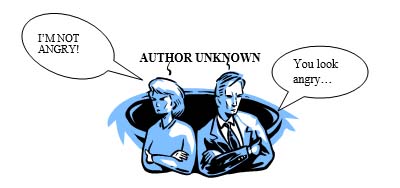
The Tone of the Voice
It’s not so much what you say
As the manner in which you say it;
It’s not so much the language you use
As the tone in which you convey it;
“COME HERE!” I sharply said,
And the child cowered and wept.
“Come here,” I said —
He looked and smiled
And straight into my lap he crept.
Words may be mild and fair
And the tone may pierce like a dart;
Words may be soft as the summer air
But the tone may break my heart;
For words come from the mind
Grow by study and art —
But tone leaps from the inner self
Revealing the state of the heart.
Whether you know it or not,
Whether you mean or care,
Gentleness, kindness, love and hate,
Envy, anger are there.
Then, would you quarrels avoid
And peace and love rejoice?
Keep anger not only out of your words —
Keep it out of your voice.

Our ‘meta-communication’ tells the truth. Meta-communication is everything that is not verbalized. Body language, tone, tempo and rate of voice all communicate what you are really thinking and feeling. This is what others react to and this is how we can shut down healthy and effective communication. Be aware of what you are really communicating and make efforts to be honest and open so your outsides match what’s going on inside.


 Relapse does not ‘just happen’
Relapse does not ‘just happen’ 


 The recent shooting at the Sandy Hook Elementary School in Newtown, Connecticut, continues to bring out strong emotions across the Nation. The Disaster Distress Helpline, 1-800-985-5990, can provide immediate counseling to anyone who needs help in dealing with the many issues and problems that might arise from this tragedy.
The recent shooting at the Sandy Hook Elementary School in Newtown, Connecticut, continues to bring out strong emotions across the Nation. The Disaster Distress Helpline, 1-800-985-5990, can provide immediate counseling to anyone who needs help in dealing with the many issues and problems that might arise from this tragedy.
 holidays and phone calls didn’t always end up like your own private reality show where you never get to turn the channel.”
holidays and phone calls didn’t always end up like your own private reality show where you never get to turn the channel.”